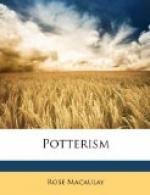1
March wore through, and April came, and warm winds healed winter’s scars, and the 1920 budget shocked every one, and the industrial revolution predicted as usual didn’t come off, and Mr. Wells’s History of the World completed its tenth part, and blossom by blossom the spring began.
It was the second Easter after the war, and people were getting more used to peace. They murdered one another rather less frequently, were rather less emotional and divorced, and understood with more precision which profiteers it was worth while to prosecute and which not, and why the second class was so much larger than the first; and, in general, had learnt to manage rather better this unmanageable peace.
The outlook, domestic and international, was still what those who think in terms of colour call black. The Irish question, the Russian question, the Italian-Adriatic question, and all the Asiatic questions, remained what those who think in terms of angles call acute. Economic ruin, political bankruptcy, European chaos, international hostilities had become accepted as the normal state of being by the inhabitants of this restless and unfortunate planet.
2
Such was the state of things in the world at large. In literary London, publishers produced their spring lists. They contained the usual hardy annuals and bi-annuals among novelists, several new ventures, including John Potter’s Giles in Bloomsbury (second impression); Jane Hobart’s Children of Peace (A Satire by a New Writer); and Leila Yorke’s The Price of Honour. (’In her new novel, Leila Yorke reveals to the full the Glittering psychology combined with profound depths which have made this well-known writer famous. The tale will be read, from first page to last, with breathless interest. The end is unexpected and out of the common, and leaves one wondering.’ So said the publisher; the reviewers, more briefly, ‘Another Leila Yorke.’)
There were also many memoirs of great persons by themselves, many histories of the recent war, several thousand books of verse, a monograph by K.D. Varick on Catalysers and Catalysis and the Generation of Hydrogen, and New Wine by the Reverend Laurence Juke.
The journalistic world also flourished. The Weekly Fact had become, as people said, quite an interesting and readable paper, brighter than the Nation, more emotional than the New Statesman, gentler than the New Witness, spicier than the Spectator, more chatty than the Athenaeum, so that one bought it on bookstalls and read it in trains.
There was also the new Pinkerton fourpenny, the Wednesday Chat, brighter, more emotional, gentler, spicier, and chattier than them all, and vulgar as well, nearly as vulgar as John Bull, and quite as sentimental, but less vicious, so that it sold in its millions from the outset, and soon had a poem up on the walls of the tube stations, saying—




